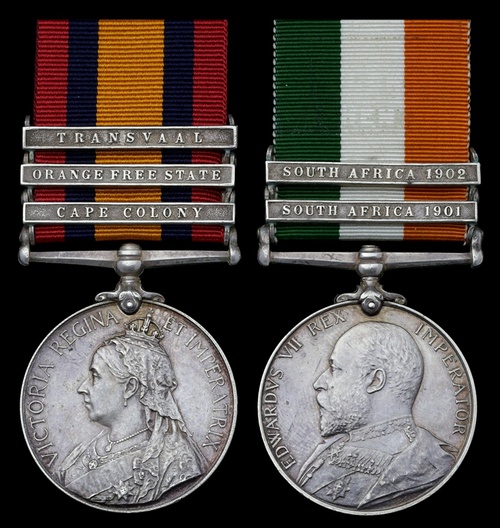
Auction: 19003 - Orders, Decorations and Medals
Lot: 175
(x) '... The late Major Young served with the Imperial forces, and was attached later to the Poona Horse and Bombay Cavalry. He rendered distinguished service in the Afghan and South African wars, being wounded several times. On one occasion his horse was shot under him. He was thanked in despatches by Lord Methuen for a most courageous attempt to blow up a bridge and train. From 1899 to 1900 he was head of the Intelligence Service at Lourenco Marques, Portuguese East Africa, and was thanked by the authorities for good work there. ...'
Extract from Young's obituary in The Albany Advertiser, Western Australia, 13 August 1929.
The fascinating Boer War pair to Major H. P. Young, Indian Staff Corps, who served as Head of Intelligence at Delagoa Bay during Winston Churchill's famous escape from Pretoria
Queen's South Africa 1899-1902, 3 clasps, Cape Colony, Orange Free State, Transvaal (Major H. P. Young, Staff.); King's South Africa 1901-02, 2 clasps (Major H. P. Young, I.S.C.), naming engraved in italic serif capitals, the second with edge bruising, very fine (2)
Provenance:
Lovell Collection, 1982.
Henry Pottinger Young was born on 2 January 1850, the son of Major Charles Colville Young, C.B. of the Royal Horse Artillery. Educated at Wellington College, he attended the Royal Military College, Sandhurst and was commissioned as Ensign in the 49th Foot in February 1869. He was promoted to Lieutenant in the Indian Staff Corps in March 1871 and served during the Second Afghan War as an officer in the Transport Train, Scinde Reserve Division, Southern Afghanistan Field Force. Since Young served on lines of communication rather than in the theatre itself, he was never entitled to the Afghanistan 1878-80 Medal. Advanced to Captain in 1881, six years later he commanded a party in long-distance trial rides, riding 184 miles in 60 hours with one horse bearing 14 stone. He rose to Major in 1889, retiring in 1889.
Young offered his services during the Boer War, sailing with an Indian contingent to Delagoa Bay (now Maputo Bay) in Portuguese East Africa. In 1899 he was appointed Head of Intelligence in that region, responsible for ensuring that arms and munitions did not fall into Boer hands. When Winston Churchill made his famous escape from Pretoria on 12 December that year, this small Portuguese territory was his lifeline. Six days after escaping he found a train standing in a siding on the Delagoa Bay railway line, which he boarded. This train carried him the 300 miles to neutral territory. Churchill would almost certainly have reported to Young on arrival there. In April 1901 Young was assigned the role of Assistant Press Censor, an important position which was graded as Deputy Assistant Adjutant General (see London Gazette 19 June 1900). Young was so effective in this role that in November 1900 he was appointed Chief Censor of Orange River Colony. From May 1901 he held a senior staff role in the Army Service Corps, while also undertaking Special Intelligence Duty in the Barkley East District. On the conclusion of hostilities he migrated to Albany, King River, Western Australia, where he died in 1929; sold with copied research.
Subject to 5% tax on Hammer Price in addition to 20% VAT on Buyer’s Premium. For more information please view Terms and Conditions for Buyers.
Estimate
£400 to £500
Starting price
£280




